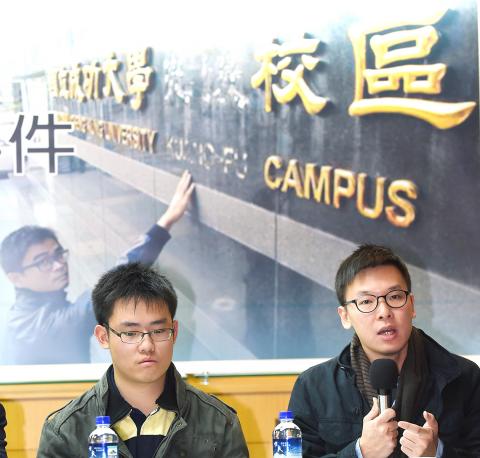Civic groups and Sunflower movement leader Lin Fei-fan (林飛帆) yesterday voiced support for former National Cheng Kung University student Lee Ying-jui (李盈叡), who was charged with and acquitted of vandalism for damaging a campus sign, but faces more legal action.
They held a Taipei news conference to condemn the Greater Tainan school’s suit and a prosecutor’s decision to appeal Lee’s acquittal.
The case stems from a 2013 university request that the student association choose the name of a new campus plaza. Although an overwhelming number of students voted to name the square after democracy and human rights activist Deng Nan-jung (鄭南榕) officials rejected the students’ decision.

Photo: Liu Hsin-de, Taipei Times
University president Huang Huang-hui (黃煌輝) said a university should not get involved in political activities or embrace a specific political ideology.
Students protested that stance, saying that the names of the school’s two campuses should then be changed, since the Chung-cheng (中正) campus was named for Chiang Kai-shek (蔣介石) and the Kuang-fu (光復) campus referred to the “return of Taiwan to China after Japanese colonial rule.”
Lee, then a political science graduate student, removed the characters for kuang-fu from a sign at an entrance to the school.
He was indicted by prosecutors, but acquitted by the Tainan District Court. However, prosecutors have appealed the verdict.
“After he removed the characters, he did not run away. He stayed there to be arrested, because he wanted to call the school administration’s attention to the issue. It was an act of freedom of expression,” Lin, a Cheng Kung alumnus, told reporters. “University campuses are places where we should have 100 percent freedom of speech. However, we regrettably have not achieved democracy on campus, and it is just ridiculous that National Cheng Kung University even filed a lawsuit against one of its students.”
Attorney and human rights activist Huang Di-ying (黃帝穎) said that judging by Council of Grand Justices’ constitutional interpretations, Lee’s act was a symbolic expression of protest.
“I am glad the Tainan District Court values the freedom of expression over National Cheng Kung University’s property, but I am worried that there may be many authoritarian-era judges in the Taiwan High Court who lack true understanding of democracy, and could overturn the district court’s verdict,” Huang said.
Representatives from the Taiwan Association of University Professors and the Deng Liberty Foundation also attended the news conference to support Lee.

The manufacture of the remaining 28 M1A2T Abrams tanks Taiwan purchased from the US has recently been completed, and they are expected to be delivered within the next one to two months, a source said yesterday. The Ministry of National Defense is arranging cargo ships to transport the tanks to Taiwan as soon as possible, said the source, who is familiar with the matter. The estimated arrival time ranges from late this month to early next month, the source said. The 28 Abrams tanks make up the third and final batch of a total of 108 tanks, valued at about NT$40.5 billion

Two Taiwanese prosecutors were questioned by Chinese security personnel at their hotel during a trip to China’s Henan Province this month, the Mainland Affairs Council (MAC) said yesterday. The officers had personal information on the prosecutors, including “when they were assigned to their posts, their work locations and job titles,” MAC Deputy Minister and spokesman Liang Wen-chieh (梁文傑) said. On top of asking about their agencies and positions, the officers also questioned the prosecutors about the Cross-Strait Joint Crime-Fighting and Judicial Mutual Assistance Agreement, a pact that serves as the framework for Taiwan-China cooperation on combating crime and providing judicial assistance, Liang

A group from the Taiwanese Designers in Australia association yesterday represented Taiwan at the Midsumma Pride March in Melbourne. The march, held in the St. Kilda suburb, is the city’s largest LGBTQIA+ parade and the flagship event of the annual Midsumma Festival. It attracted more than 45,000 spectators who supported the 400 groups and 10,000 marchers that participated this year, the association said. Taiwanese Designers said they organized a team to march for Taiwan this year, joining politicians, government agencies, professionals and community organizations in showing support for LGBTQIA+ people and diverse communities. As the first country in Asia to legalize same-sex

MOTIVES QUESTIONED The PLA considers Xi’s policies toward Taiwan to be driven by personal considerations rather than military assessment, the Epoch Times reports Chinese President Xi Jinping’s (習近平) latest purge of the Chinese People’s Liberation Army (PLA) leadership might have been prompted by the military’s opposition to plans of invading Taiwan, the Epoch Times said. The Chinese military opposes waging war against Taiwan by a large consensus, putting it at odds with Xi’s vision, the Falun Gong-affiliated daily said in a report on Thursday, citing anonymous sources with insight into the PLA’s inner workings. The opposition is not the opinion of a few generals, but a widely shared view among the PLA cadre, the Epoch Times cited them as saying. “Chinese forces know full well that